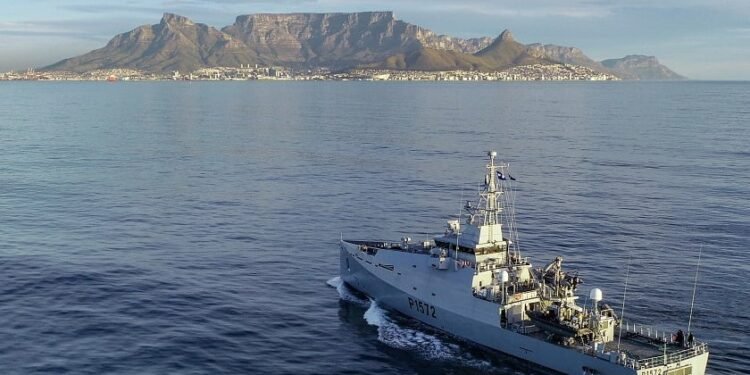
The construction of three new multi-mission inshore patrol vessels (MMIPVs) for the South African Navy has created over 1 000 direct jobs at shipbuilder Damen Shipyards Cape Town (DSCT) and 4 000 indirect jobs.
This is according to DSCT, which said the project has also fortified regional supply chains and created opportunities for skilled job seekers, promoting economic prosperity in South Africa’s Ocean Economy.
Throughout the project’s duration, it is estimated to have generated more than one million man-hours of work.
“The MMIPV project has not only fortified South Africa’s maritime security but also contributed significantly to job creation and the development of small and medium-sized enterprises (SMEs). A total of 848 local vendors have actively participated in the construction of the MMIPVs, highlighting the effectiveness of South Africa’s industrial participation policy,” DSCT said in a statement.

Armscor, as the contract manager, previously explained that the acquisition strategy for this project included Commercial-Off–The-Shelf (COTS) equipment, as well as compliance with the DTI (Department of Trade and Industry) 60% local content shipbuilding designation requirement, Defence Industrial Participation (DIP) and National Industrial Participation (NIP). This ensured that Armscor could maximise local participation and ensure that the vessels can be supported locally, thereby minimising the life cycle support costs.
The second MMIPV, SAS King Shaka Zulu, was named and handed over in a ceremony on 27 October at Naval Base Durban. Built in South Africa at Damen Shipyards Cape Town, it was designed to deliver rapid response capabilities along South Africa’s extensive 2 798-kilometre coastline and it is poised to play a pivotal role in safeguarding national waters, according to DSCT.
Sefale Montsi, Director of Damen Shipyards Cape Town, emphasised the broader impact of this project on the nation’s industrialisation journey. “South Africa must continue to prioritise supporting local vessel suppliers because this creates jobs and develops transferrable skills which are in demand and can be used in other industries. New technologies are developed, opportunities from abroad are facilitated, and a base for growing exports is created and taken advantage of. As a result of our work on the MMIPV project, DSCT has exported vessels built here and equipped with South African products to Djibouti and UAE,” she said.

Chief of the SA Navy, Vice Admiral Monde Lobese, said, “I must congratulate Damen Shipyards Cape Town, Armscor, the Defence Materiel Division and the SA Navy who all formed part of the Integrated Project Team for their absolutely sterling work of building these ships on time, in budget and to specification. This was indeed a monumental task and serves as a testament to the willingness of various companies and organisations to come together to produce something that will benefit the people of South African for many years.”
The first MMIPV built under Project Biro, SAS King Sekhukhune I (P1571), was handed over to the SA Navy in May last year, while SAS Chief Adam Kok (P1573) will be delivered in the third quarter of 2024. It is 55% complete, with crew training in progress.
The 62 metre long, 750 ton vessels have a 20 knot economical speed and a range of 2 000 nautical miles. Each vessel is fitted with a Reutech 20 mm Super Sea Rogue marine gun and Reutech FORT (frequency modulated optical radar tracker) low probability of intercept (LPI) optronics radar tracking system, and carries a 9 metre and a 7 metre RHIB (rigid hull inflatable boat) for boarding and other operations.
The vessel’s Sea Axe hull design, patented by Damen, ensures exceptional seakeeping behaviour, reduced fuel consumption, and enhanced safety and comfort onboard – something of great importance given the extremely rough seas surrounding much of South Africa.
The entire Project Biro is due to be completed in August 2025 at a cost of R3.8 billion. To date R2.9 billion has been paid, according to Armscor. Project Biro was originally for six inshore patrol vessels and six offshore patrol vessels, but due to budget constraints, the SAN had to settle for three inshore patrol vessels. An option to order additional MMIPVs has been extended by DSCT to 31 December 2023.











